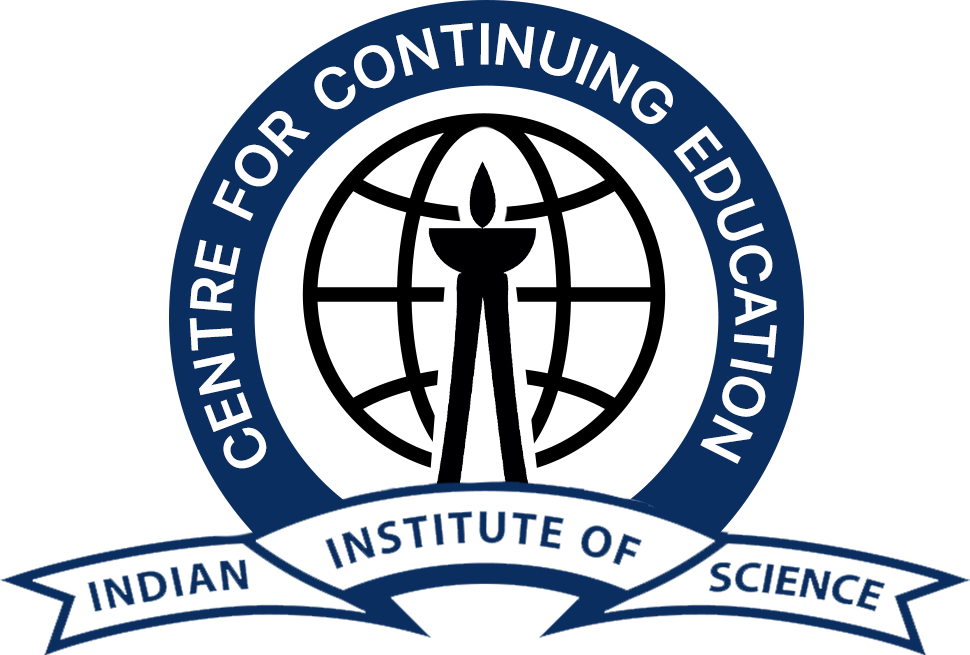Student Guidelines
The following guidelines are common to all Master of Technology (Online) programmes.
- Each stream will be structured and administered by a Programme Curriculum Committee (PCC).
-
The number of course credits will be specified by the PCC and can vary between 32 – 48 credits.
-
Project credits will constitute the remainder of the credits, so that the total comes to 64 credits for the entire programme.
-
Core course can be between 9-16 credits and will be specified by the PCC. The rest shall be electives.
-
Course grading will follow IISc’s 10-point grading system: A+ = 10, A = 9, B+ = 8, B = 7, C = 6, D = 5, F = 0.
-
Project grading will be Pass/Fail.
-
Only two F grades are permitted in the entire programme. If a third F grade is obtained, the registration will be terminated. Additional constraints apply, see F grade handling bullet below.
-
Students should get a minimum TGPA (term GPA) of 4.0/10.0 in the first term. Subsequent terms CGPA (cumulative GPA) should be at least 5.0/10.0. Students who do not satisfy these minimum requirements are liable to be discontinued from the course, and the discontinuation can be revoked only by the Director on the student providing a valid reason.
-
In the first term, if the TGPA falls between 4.0 and less than 5.0, the student will be advised to register for fewer courses in the following semester (if more than one course is credited).
-
F grade handling will be as for regular MTech’s. (If the course is a core course, the student must repeat the core course. If the course is not a core course, the student must either repeat the F-grade-course to “clear the F grade” or take a replacement course specified by the PCC. Only one chance is given to clear each F grade. If the grade is F in the repetition or in the replacement course, the student must leave the programme. Both initial F and final higher grade will be reflected in the transcript. The F grade will be used in computation of the TGPA and CGPA until it is cleared whereafter it will be omitted in the calculations).
-
Candidates can have at most two semesters break in studies. The request must come through the sponsoring organisation. Women can avail a maternity leave of up to a year in case of maternity during the programme, in addition to the above. A registration fee needs to be paid for the break semesters to keep the registration alive.
-
In each semester in which the candidate registers for credits, the candidates should register for a minimum of 3 course credits and a maximum of 12 course credits (minimum 0 course credits and maximum 8 course credits in summer term). Project credits are not counted for these limits. This is until course requirements are completed. If projects and courses are both being taken in a term, the maximum is 16 credits (project + courses) in a semester and 12 credits (project + courses) in a summer term. If registration is only for project, with no courses, the maximum is 21 project credits in a semester and 12 project credits in a summer term.
-
The normal duration is 2-3 years. In special circumstances, a student may be permitted an extension, due to break in studies or maternity leave, but must complete all requirements within a maximum of 4 years (5 years if maternity leave is availed).
-
The computation of final CGPA is done only after the student clears all courses successfully.
-
No distinction shall be awarded, since the project grade is Pass/Fail.
-
Students shall have listened to 75% of each course’s lectures. A mechanism for monitoring this will be put in place.
-
The PCC will identify a faculty mentor (or committee) during the course programme. Once the project starts, the project mentor (or committee), if different, will take over the role of faculty mentor.
-
Course dropping rules (drop without mention, drop with mention) and the dates for these will be as for the regular programmes and will be mentioned in the Student Information Handbook to be given at the start of the year. (Drop requires approval of the faculty mentor and course instructor and is permitted only if the total number of credits does not fall below the stipulated minimum. If course is dropped with mention, the dropped course will be included in the final transcript with a W (Withdrawn) grade. But the fees will not be refunded. The student may register again for a course dropped in a previous term; fees will be payable for the registration.
-
No transfer/upgradation to PhD is possible during the programme.
-
Assessment: Evaluation is based on instructors’ assessment plan which will be pre-approved by the senate curriculum committee (which approves the course). This will be indicated to the students at the start of the course.
-
Attendance in the terminal examination is compulsory. Students who are absent will be given an F grade. Absence on medical grounds, after due certification by the sponsoring organisation’s appointed medical officer (a registered medical practitioner), may be condoned and the student will take a substitute examination within a prescribed period. Additional examination fees will be payable in case of a substitute examination.
-
Project evaluation: An assigned faculty mentor, who may be a part of an evaluation committee as specified by the PCC, will be responsible for approving the project goals, for regular evaluation (as per schedule indicated by the PCC), for bringing in the needed academic rigour, and for the final evaluation. A sponsoring company guide will be identified for each student and will monitor internal progress on a regular basis. One guide (from the sponsoring company) can guide at most 6 students. The internal guide shall have a PhD or five years’ experience post Masters. Both the faculty mentor for the project and the organisational guide must be identified prior to start of the project.
-
In general, when the guidance is only from the sponsoring company, and IISc’s role is restricted to approval of goals and evaluation, IPR rests with the sponsoring company. If guidance from the IISc faculty mentor is sought by the company, a specific IPR agreement for the retainer consultancy will be negotiated and put in place. In this case, the PCC needs to be informed and the agreement must be signed before guidance by the IISc faculty mentor begins.
-
Students should complete all core course credits before commencing on projects. See also maximum credits per term constraints. Additional requirements may be set by the individual PCC.
-
Privileges and responsibilities: During the tenure and while registration fees are paid to keep the registration ongoing:
- IISc email id
- Library access
- Alumni/Alumnae privileges after the award of the degree.
Eligibility
- BE, BTech or equivalent. The specific streams have further requirements. See stream requirements given below.
- Minimum CGPA/percentage/class in all degrees as specified by the stream requirements.
- The employees should have a minimum number two years of industry experience at the time of joining.
| Stream | Degree | CGPA | Years in Industry | Others | Selection |
| Data Science and Business Analytics |
BE/BTech/BS(4yrs)/Equivalent (4-year degree/diploma after 12th standard) or Master’s degree in any discipline | At least 50% or equivalent in all degrees | Two years at the time of joining. | Strong mathematical and programming experience | Online test and online interview |
| Artificial Intelligence |
BE/BTech in CS/ECE/EE or equivalent | At least 70% or equivalent in all degrees | Two years at the time of joining. | Strong mathematical and programming experience | Online test |
| Electronics and Communication Engineering | BE/BTech in ECE/EE or equivalent | At least 60% or equivalent in all degrees | Two years at the time of joining. | Strong mathematical and programming experience | Online test |

